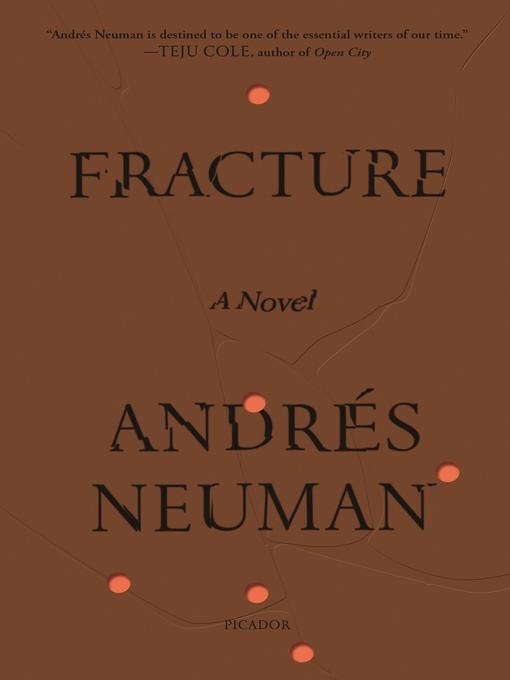
Fracture
A Novel
کتاب های مرتبط
- اطلاعات
- نقد و بررسی
- دیدگاه کاربران
نقد و بررسی

March 1, 2020
A Japanese man shattered by senseless, unimaginable violence suffers an ongoing existential crisis, documented in part by the women in his life. Spanish Argentine novelist Neuman (The Things We Don't Do, 2014, etc.) is a literary alchemist, so it's a pleasure to see his most recent work translated so quickly by Caistor and Garcia. The emotional journey here is fundamentally about the ways people break, what holds them together, and who emerges on the other side. To say its protagonist is a survivor is technically accurate but underplays the damage that forms his fundamental character. Yoshie Watanabe narrowly avoided being killed at Hiroshima as a boy but lost his entire family in the blast. Decades later, an elderly and retired Watanabe is rocked again when he's proximate to the tsunami that devastated the nuclear reactor at Fukushima in 2011. Watanabe's life story is relayed, appropriately, in fragments, punctuated by narration from the women most important to him. Yoshie refuses to identify as hibakusha, the label attached to survivors of the atomic blasts. But he's never really whole, either, devoting his life to an undying quest for order, punctuated by an obsessive nature and a heartfelt admiration for the obscure art of kintsugi, an ancient practice that repairs shattered things with gold. Leonard Cohen's song "Anthem"--"There's a crack in everything / that's how the light gets in"--immediately comes to mind, and Neuman himself nods to it. The women are interesting reflections here--there's a fellow student Yoshie has a fevered romance with in Paris; a politically active journalist he has a combative liaison with in New York; an interpreter in Buenos Aires; and a widow with three children in Madrid. The uniformity of the women's cadence and vocabulary tarnishes their individuality a bit, but the story remains a moving meditation on the reverberating waves that shape us and the inescapable impermanence of life. A quiet study of a man struggling to find a serenity to quell his long-entrenched terror.
COPYRIGHT(2020) Kirkus Reviews, ALL RIGHTS RESERVED.

March 23, 2020
The stirring latest from Neuman (Traveler of the Century) opens just before an earthquake sparks the 2011 Fukushima nuclear disaster on Japan’s east coast. Retiree Yoshie Watanabe, a survivor of the Hiroshima and Nagasaki bombings that killed his family during WWII, watches in relative safety from his Tokyo neighborhood as the coastline braces for nuclear fallout. Yoshie, a former electronics executive, has lived in Paris, New York, Buenos Aires, and Madrid during his career, and in alternating chapters, Neuman fills in his protagonist’s history via first-person recollections by Yoshie’s past lovers. These stories occasionally pale in comparison to the immediacy of the 2011 narrative, as Yoshie travels to areas affected by the disaster, where he wrestles with the loss he carries from the atomic bombings and realizes that all the past phases of his life were ways to “shed his skin” and escape “from a previous somewhere.” Now, Yoshie reflects on the odd symmetry between the aftermath of the atomic bombings and the current disaster. Neuman slowly builds meaning in the book’s recursive structure and language (“he repeats silently the formula, part arithmetic, part nightmare, that hundreds of millions of people all over the planet have had to learn”). This weighty meditation on human interconnection is well worth a look.

April 15, 2020
A talented travel writer (How to Travel without Seeing, 2016), inventive storyteller (The Things We Don't Do, 2015), and acclaimed novelist (Talking to Ourselves, 2014), Neuman presents a realist novel told in an unconventional style which centers around one man's life as refracted through the viewpoints of numerous women who knew him. It opens on the morning of the Fukushima nuclear disaster in Japan, an especially triggering event for Yoshie Watanabe, who survived the nuclear attack on Hiroshima, though he refuses to reconcile the experience with his sense of identity. Speaking from different times in Watanabe's life and four locales?France, New York, Argentina, and Spain?the women share their experiences, piecing together a multifaceted portrait of an enigmatic man, all echoing a sentiment voiced early on: "Nothing occurs in only one place . . . everything occurs everywhere." As with the ancient art of kintsugi, a practice in which broken items are repaired with gold, Watanabe's life story coheres around the profound trauma and permanent impact of that fateful day. Another fascinating work of fiction from a generously prolific author.(Reprinted with permission of Booklist, copyright 2020, American Library Association.)

Starred review from June 1, 2020
Yoshie Watanabe, a retired electronics company executive and physically and emotionally scarred survivor of Hiroshima, makes a trip to Fukushima shortly after the 9.0 magnitude earthquake and subsequent tsunami struck Japan and caused radioactive fallout from the nearby nuclear reactor. As the title indicates, Watanabe's life is fractured as he moves around the globe with career transfers, failing to maintain a relationship for more than a few years. Equally fractured is the novel's structure, with the text broken into sizable chunks that alternate between the narrator, who traces Yoshie's nomadic life from his boyhood in the mid-1940s to his retirement in the 21st century, and narratives by Watanabe's international assortment of lovers in Paris, New York, Buenos Aires, and Madrid. The Alfaguara Prize-winning Neuman succeeds in individualizing and exposing his female characters based entirely on their monologs, a format that recalls his earlier Talking to Ourselves. He also cautions about the dangers of repeated nuclear disaster from Hiroshima to Fukushima. VERDICT The fragmented and destructive power wielded by memory and trauma in developing one's outlook on life, coupled with a two-pronged narrative technique for character development, makes Neuman's latest a winner.--Lawrence Olszewski, North Central State Coll., Mansfield, OH
Copyright 2020 Library Journal, LLC Used with permission.

























دیدگاه کاربران